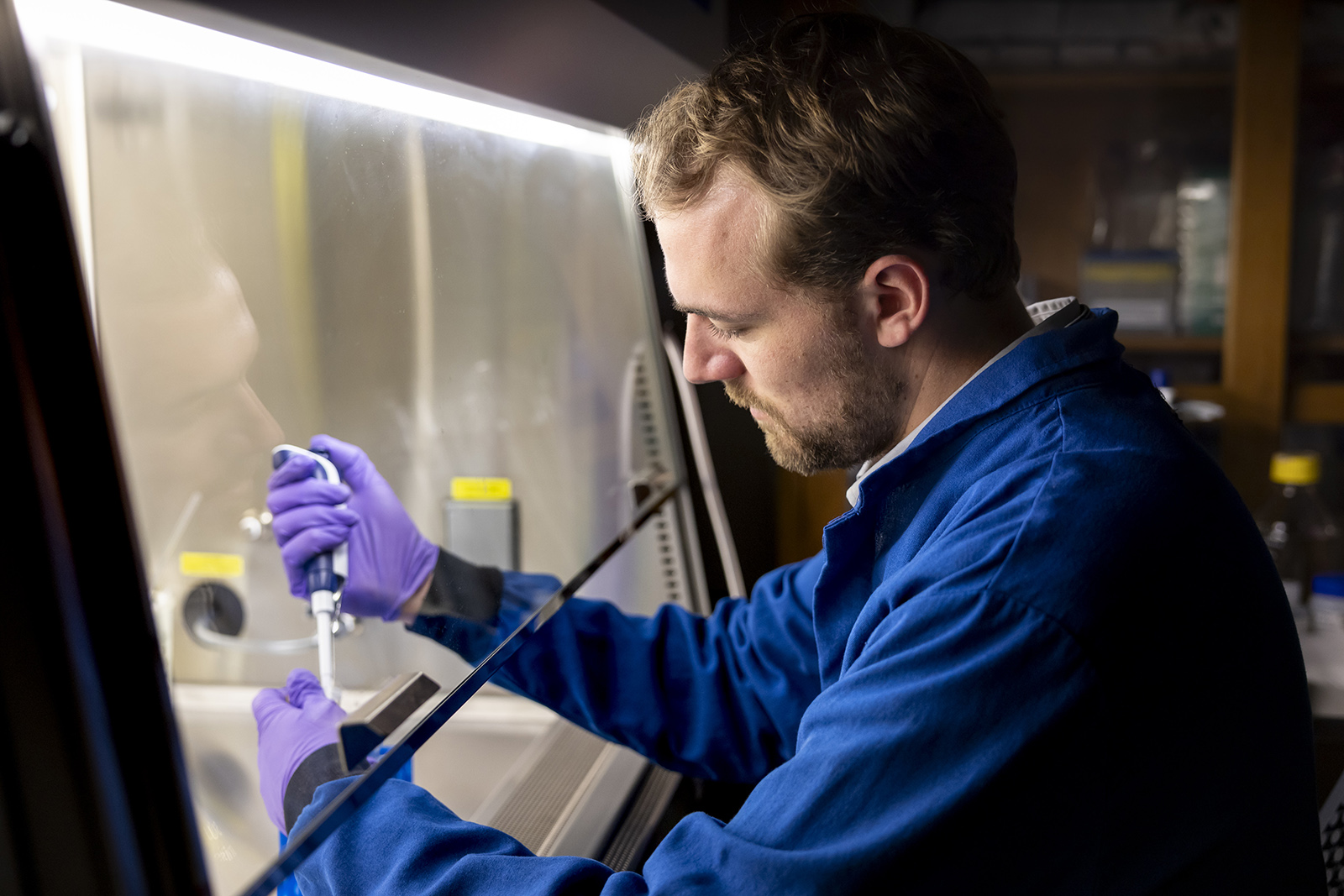LSU Researchers Harness Natural Compounds to Combat Louisiana’s High Cancer Rates
February 24, 2025
Louisiana has one of the highest state cancer rates in the United States, with 27,000 new cases each year, according to the National Institutes of Health.

Jake Barras, Ph.D. student, LSU Department of Chemistry
That can be traced partially to residents’ dietary choices, including the popularity of fried foods in Louisiana and the rest of the South, according to an LSU team researching ways to address the problem.
Fatima Rivas, assistant professor in LSU’s Department of Chemistry, and graduate student Jake Barras are leading that team as it explores how natural substances can be used to create new treatments for conditions like metabolic syndrome and obesity — issues that can increase a person's cancer risk.
“In Louisiana, we have a high incidence of specific cancer subtypes, particularly breast cancer and colorectal cancer,” Rivas says. “These diets, unfortunately, can promote metabolisms that are not necessarily ideal for healthy individuals. In other words, these metabolisms might be hyperactive, and they can promote some cancer subtypes.”
“Being able to come here (to LSU) and utilize my strengths in science and chemistry in order to provide new therapeutics and treatment options … is something that I'm really excited about.”
Jake Barras
In his three years in the state, Barras has heard stories from Louisianans about how cancer has affected them and their loved ones. He says those personal stories motivate him to find new ways to overcome the medical issues people face, leading to better patient outcomes.
“Helping people is at the core of my motivation,” he says. “And being able to come here and utilize my strengths in science and chemistry in order to provide new therapeutics and treatment options … is something that I'm really excited about.”
Barras, from Maple Grove, Minn., earned his undergraduate degree in chemistry from the University of North Carolina Wilmington. Inspired by a research advisor’s recommendation, Barras decided to pursue his graduate studies at LSU, where he is now working towards his doctorate in organic chemistry.
“I was overwhelmed by the resources available here and the caliber of research that was being conducted. And I was really excited to be a part of it,” he says.






About the Research
The research focuses on leveraging natural products as therapeutics for different diseases, thereby addressing inflammation and insulin impairment in the body.
“Obesity-inspired or obesity-imposed chronic inflammation can dampen the entire body's ability to respond to signaling hormones such as insulin, which is involved in blood sugar metabolism,” Barras says. “And this dysfunction can set off a whole cascade of reactions, which results in a patient having a higher susceptibility for cancer.”
Barras and the team are working to develop a novel set of inhibitors for a regulatory enzyme called PTP1B that is involved in insulin signaling. Decreasing the activity of PTP1B will allow the proteins that respond to insulin to remain active for longer, thus mitigating the risk of insulin resistance and addressing a patient's susceptibility to cancer.
“We start with a natural product that's isolated from a plant that has a certain favorable biological activity that we've noticed in these screening assays that we do,” Barras says. From there, the team works to improve the product’s efficacy and identify the specific route through which it’s working.
A Team & Family Atmosphere
Barras says conducting research at LSU has been “nothing but great,” with close relationships among team members that resemble a family bond, where everyone is devoted to self-improvement and improving each other.
“My experience in the lab has been incredible,” Barras says. “I've had a great time working with Dr. Rivas, who has led me to develop not only professionally but personally.
“At LSU, we're very focused on teamwork. It's a team effort. We have a high emphasis on training the next generation of scientists.”
Fatima Rivas
“I have a great set of graduate student colleagues. And our staff scientist, Dr. Taotao Ling, is also incredible as a guiding force in my organic chemistry efforts.”
Rivas says the team aspect Barras experienced is by design.
“At LSU, we're very focused on teamwork. It's a team effort. We have a high emphasis on training the next generation of scientists,” she says, adding that graduate students take on the role of mentors for undergraduate students, passing on research techniques and best practices they learned in their graduate training.
“It is important to emphasize that students … drive this work,” she says.
She also stresses that multiple collaborators, including those outside the LSU Chemistry Department and outside of Louisiana, play a role in the scientific advancements achieved in the lab.
Collaborators include LSU’s Pennington Biomedical Research Center and the university’s School of Veterinary Medicine. Rivas’ team also maintains a close relationship with Universidad Central del Caribe in Puerto Rico, exchanging knowledge through a training partnership that allows students from both universities to work and learn at the partner institution.
Finding a Good Fit at LSU
Barras says his work at LSU has been fundamental to his development and progression toward his career goals.
“My career aspirations are to be involved in medical development. I have always really found it important to make efforts to help others and be able to use my skill set specifically to do so.”
He says his academic experience at LSU allows him to enthusiastically recommend the university to other aspiring researchers, adding that the personal connection he has forged with his colleagues and others is another major selling point.
“In my whole life, I don't think I've found such a welcoming group of people as I have in Louisiana,” Barras says. “And it's been wonderful. Really forming strong relationships with people has helped me connect more to my research.
“LSU is a great institution with plenty of opportunities for anyone who’s open to putting in effort and working towards their goals.”
Next Step
Discover stories showcasing LSU’s academic excellence, innovation, culture, and impact across Louisiana.


